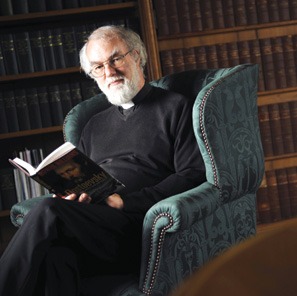A few years ago, for a strange reason, I went to a Pentecostal church service that was packed with over 800 worshippers. It began when a band struck up the opening hymn and a huge screen unfurled with a little bouncy ball popping across the words so everyone could sing along. The opening verse went "The Lord watches over us / He kills all his enemies / And the hills melt like wax / La la la la la."
It was for reasons like this I always thought atheism was obvious, because while acknowledging the complex metaphysical debates that have taxed the greatest minds over thousands of years, the most convincing argument against religion is that it's crazy. And never more so than when believers try to justify themselves, though you've got to admire creationists for being thorough. One issue of the Jehovah's Witness magazine Awake, starts "Many of the conclusions by evolutionists are speculative, based on a few old teeth and bones." And maybe they have a point that, on some biological matters, Darwin wasn't entirely accurate. Yet they don't get round to assessing, with the same fine attention to detail, the theory that goes "Lo, and woman was invented out of a man's rib but ruined paradise after being persuaded to eat an apple by a talking snake, and Methuselah lived to 969, Moses split the sea in two and when Jonah was burped out by a whale he was basically all right although obviously a little shaken."But while researching the lives of an assortment of thinkers for my radio series The Mark Steel Lecture, I've become more sympathetic to the view that the issue isn't as easily settled. Firstly, because all the individuals who made the greatest contribution to undermining the dominance of religion were making a genuine attempt to redefine God, rather than dispense with him altogether. Galileo was forced to retract his discovery that Jupiter had moons, which upset the Catholic notion that there were only seven heavenly bodies, seven being the heavenly number. In effect the Pope sent his hoods to tell Galileo "You didn't see no moons tonight all right." To be fair to the Vatican they did withdraw their accusations in 1998. So give it 300 years and they'll apologise for fiddling with hordes of choirboys as well.
But despite the importance of this breakthrough, Galileo was a committed and active Christian. As was Isaac Newton whose spiritualism ran to a lifelong dedication to alchemy and support for groups who believed they could make themselves invisible. Darwin himself insisted he was allowing Christianity to modernise, as if he was creating NEW Jesus. Every time a central notion of Christianity was disproved, the creed adapted and carried on regardless. But this process also displays the limitations of religion as a force; having to eventually abandon its core values when they run into conflict with events in the real world. So the greatest ideological heroes have often been those, from Leonardo da Vinci to Muhammad Ali, who've seen their mission as creating a more just and rational world, in line with a just and rational God, who they see as having been betrayed by the priests of their day.
Similarly, the problem with the Church of England isn't that it's religious, it's that it's twee Cliff Richard Vicar of Dibley Garden Fete Tony Blair Neighbourhood Watch religious. As if a God that flooded the entire planet in a tantrum can be fobbed off with a tin of unwanted apricots at Harvest Festival. It's the same with the Thought For the Day slot on Radio 4. If it carried a bit of Pentecostal hill-melting at least it would involve some passion. Instead it's like a panel game in which Jesus has to be twisted into that day's news. So a typical piece goes "Well, the row about exam testing continues to rumble, but isn't this a bit like Jesus? For though Jesus never had to sit 'A' levels, he certainly had to do tests. When he went into the wilderness wasn't that God's way of saying 'you may turn over your papers and begin now'. And also lots of teachers have beards just like Jesus."
The danger is not so much in the ideology as the way it's used. For example, George Bush is already claiming that in his bombing campaigns, "God is on our side." Of course he is. God's ALWAYS on our side in war. There is no case, as far as I know, of a General ever saying to his troops "Last night I prayed, in this, our time of need, to God. But unfortunately it seems he's backing the Turks on this one."

